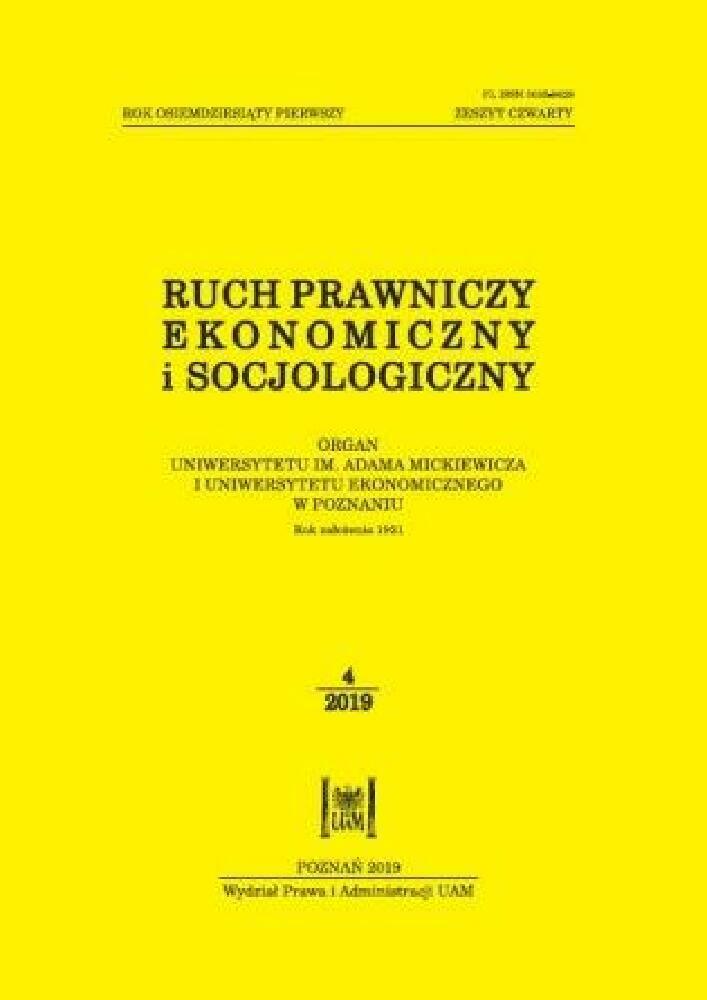Abstract
This paper focuses on the premises underlying the legal concept of the integrated development planning model. The author draws attention to external exigencies (resulting from EU policies and the provisions of EU legislation), as well as internal (national) circumstances which need to be taken into account when devising an integrated model for planning. It is underscored that an integrated approach means concentrating action geared towards the accomplishment of strategic development goals that constitute major objectives both for all entities of public authority in the country, that is, governmental and self-governmental tiers, as well as for social and economic partners. Also, the author highlights that an appropriately constructed mechanism of the integrated approach in national development programming should rely on integrating state efforts in the domain of strategic programming for development policy with horizontal and sectoral planning. The paper thus outlines the components of the legal mechanism of development-related programming that are intended to serve the formulation of the integrated approach as model solutions. The suggestions and conclusions advanced in the paper may contribute to an integrated paradigm of development programming that, when implemented, will make it possible to enhance the efficiency and effectiveness of the actions undertaken by public administration.
References
Egerer, J. (1971). Der Plangewährleistungsspruch [Warranties in Planning]. Baden-Baden.
Finta, I. (2019). The planned legal regulation of the EU’s post-2020 development policy – or an assassination against the countryside. European Countryside 11(1): 162–177.
Glueck, W.F. (1980). Strategic Management and Business Policy. New York.
Gow, J.I., Dofour, C. (2000). Is the new public Management a paradigm? Does it matter? International Review of Administrative Sciences 66(4): 573–597.
Grosse, T.G. (2008). Zintegrowane podejście do rozwoju – rola polityki spójności [Integrated Approach to Development. The Role of Cohesion Policy]. Warsaw.
Hausner, J. (2008). Zarządzanie publiczne [Public Management]. Warsaw.
Hofmann, H.C.H., Türk, A.H. (eds.). (2009). Legal Challenges in EU Administrative Law. Towards an Integrated Administration. Cheltenham, UK – Northampton, MA, USA.
Ipsen, H.P. (1966). Rechtsfragen der Wirtschaftsplanung [Legal issues in economic planning], [in:] J.H. Kaiser (ed.), Planung II: Begriff und Institut des Plans [Planning II: The Notion and Institution of Planning]. Baden-Baden.
Jeżewski, J. (2002). Podstawy prawne planowania rozwoju regionalnego [Legal foundations for regional development planning], [in:] A. Błaś (ed.), Studia nad samorządem terytorialnym [Studies on Territorial Self-Government]. Wrocław: 288–300.
Kiczka, K. (2015). Administracja gospodarcza w warunkach Unii Europejskiej [Economic administration in the conditions of the European Union]. Przegląd Prawa i Administracji 3661, Wrocław: 307–318.
Koch, D.-J. (2017). Measuring long-term trends in policy coherence for development. Development Policy Review 36: 87–110.
Kokocińska, K. (2014). Prawny mechanizm prowadzenia polityki rozwoju w zdecentralizowanych strukturach władzy publicznej [Legal Mechanism for Operating Development Policy in Decentralized Structures of Public Authority]. Poznań.
Kokocińska, K. (2015). Cooperation of central and self-government structures for the purpose of development. Ruch Prawniczy, Ekonomiczny i Socjologiczny 77(3): 181–191; DOI: 10.14746/rpeis.2015.77.3.13.
Kokocińska, K. (2018). ‘Zespół wzajemnie powiązanych działań’ jako kwalifikowana forma współpracy podmiotów władzy wykonawczej [‘Complex of reciprocally connected actions’ as aqualified form of cooperation between executive entities], [in:] A. Cudak, I.M. Szkotnicka (eds.), Państwo, administracja i prawo administracyjne w europejskiej kulturze prawnej. Księga jubileuszowa dedykowana Profesorowi Janowi Andrzejowi Jeżewskiemu z okazji osiemdziesiątej rocznicy urodzin [State, Administration and Administrative Law in European Legal Culture. Anniversary Volume in Honour of Professor Jan Andrzej Jeżewski on His 80th Birthday]. Warsaw: 173–183.
Kokocińska, K. (2018). Zintegrowane programowanie rozwoju państwa (od koncepcji do realizacji) [Integrated programming of national development (from the concept to implementation)], [in:] L. Bielecki, J. Mojak, A. Żywicka (eds.), Bezpieczeństwo gospodarcze i finansowe Polski w ujęciu prawa publicznego i prywatnego [Economic and Financial Security of Poland in the Light of Public and Private Law]. Lublin: 33–48.
Kyriacou, A.P., Muinelo-Gallo, L., Roca-Sagalés, O. (2015) Fiscal decentralization and regional disparities: the importance of good governance. Papers in Regional Science 94(1): 89–107.
Lipowicz, I. (2008). Europeizacja administracji publicznej [Europeanization of public administration]. Ruch Prawniczy, Ekonomiczny i Socjologiczny 70(1): 5–17.
Ochendowski, E. (2009). Prawo administracyjne. Część ogólna [Administrative Law. General Principles and Provisions]. Toruń.
Rabska, T. (2009). Działania administracji publicznej w świetle współczesnej koncepcji publicznego prawa gospodarczego [Actions of public administration in the light of the contemporary concept of public economic law], [in:] B. Popowska, K. Kokocińska (eds.), Instrumenty i formy prawne działania administracji gospodarczej [Instruments and Legal Forms of Action in Economic Administration]. Poznań: 15–34.
Rodrĩguez-Pose, A., Tselios, V. (2019). Well-being, political decentralisation and governance quality in Europe. Journal of Human Development and Capabilities 20(1): 69–93.
Schmidt-Assmann, E. (2001). Planowanie przestrzenne – prawo planowania – komunalna administracja samorządowa [Spatial planning – planning law – communal self-government administration], [in:] Instytucje współczesnego prawa administracyjnego. Księga jubileuszowa profesora zw. dra hab. J. Filipka [Institutions of Contemporary Administrative Law. Anniversary Volume in Honour of Professor J. Filipek]. Cracow: 625–634.
Lins Aracaty E Silva, M., Fróes Da Costa, M. (2018). Education, culture and regional development: reflections on the creative economy. Revista de Administração da Universidade Federal de Santa Maria 11(2): 894–908.
Stahl, M. (2013). Szczególne prawne formy działania administracji [Particular legal forms of action], [in:] R. Hauser, Z. Niewiadomski, A. Wróbel (eds.), System prawa administracyjnego [The System of Administrative Law]. Volume 5: Prawne formy działania administracji [Legal Forms of Administrative Action]. Warsaw: 143–161.
Strzyczkowski, K. (1985). Administracyjnoprawne instytucje planowania [Administrative and Legal Institutions in Planning]. Warsaw.
Suwaj, P.J., Szczepankowski, R. (2009). Wokół pojęcia polityki publicznej [Remarks on the notion of public policy], [in:] B. Kudrycka, B.G. Peters, P.J. Suwaj (eds.), Nauka administracji [Administrative Science]. Warsaw: 303–306.
Szreniawski, J. (2000). Wstęp do nauki administracji [Introduction to Administrative Science]. Lublin.
Szydło, M. (2006). Planowanie indykatywne jako funkcja państwa wobec gospodarki [Indicative planning as a function of the state in economy], [in:] B. Popowska (ed.), Funkcje współczesnej administracji gospodarczej. Księga dedykowana profesor Teresie Rabskiej [Functions of the
Contemporary Economic Administration. A Volume Dedicated to Professor Teresa Rabska].
Poznań: 143–162.
License
Copyright (c) 2019 WPiA UAM

This work is licensed under a Creative Commons Attribution-NonCommercial-NoDerivatives 4.0 International License.





